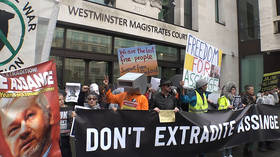‘I can’t think properly’: Assange disoriented as court rejects delay for extradition proceedings

With his supporters rallying outside the court building, Julian Assange showed signs of exhaustion and psychological torment as his lawyer made a bid to delay US extradition proceedings – but the London court ruled against him.
Cleanly shaven and dressed in a navy suit, the WikiLeaks co-founder appeared before Westminster Magistrates Court on Monday to seek the postponement of an extradition hearing scheduled for February – but the impact of six months behind bars at London’s maximum security Belmarsh Prison have clearly taken a toll.
A weary Assange defiantly raised his fist to supporters in the public gallery, but the imprisoned Australian whistleblower understandably did not appear to be in good spirits. Reports from inside the court suggest that Assange, who shot to international prominence for revealing US war crimes, even struggled to say his own name and date of birth. He reportedly held back tears as he told the court that he couldn’t “think properly.”
His lawyer argued that the US government had attempted to kidnap and cause harm to Assange, and said he would need more time to compile evidence for the case.
Today in court, Julian Assange struggled to say his own name and date of birth as he appeared in the dock. He claimed to have not understood what happened in the case management hearing, and was holding back tears as he said: "I can't think properly".
— Tristan Kirk (@kirkkorner) October 21, 2019
UN special rapporteur on torture Nils Melzer warned in July that Assange's health was deteriorating in prison after visiting him with two medical experts to assess the extent of ill-treatment he has been facing.
Melzer said Assange showed all the symptoms typical “prolonged and sustained exposure to severe psychological stress, anxiety and related mental and emotional suffering” and that his cognitive and sensory capacity have been “significantly impaired.” Fellow Australian journalist John Pilger also spoke of Assange's unabated "psychological torture" after a visit to Belmarsh in August, though their warnings have typically fallen on deaf ears among the UK media and officialdom.
Outside the court, angry protesters chanted slogans and held up a giant banner reading “Don’t extradite Assange” – but the court ultimately rejected the proposed delay.
In a video published by Ruptly, activists can be seen trying to surround a police van believed to be carrying Assange. Officers at the scene rushed to move protesters away from the vehicle.
The United States has charged Assange with possession and dissemination of classified information. If found guilty, he could receive up to 175 years in prison. The journalist has been in Washington’s crosshairs for more than a decade, after WikiLeaks published a video showing the US military attacking journalists and civilians in Iraq in July 2007.
Like this story? Share it with a friend!














